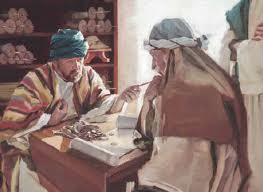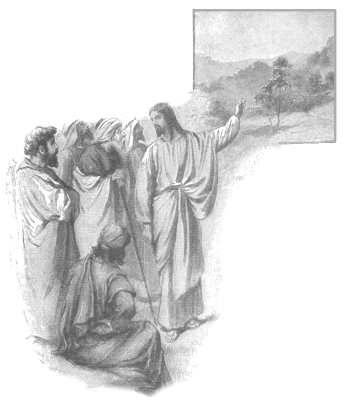google-site-verification: google85f203565cb16b4c.html
Making Better Thought-Movies One Truth At A Time
_________________________________
The Parable of the
Unjust Steward

The Parable of the Unjust Steward:
Luke 16.1-9
Jesus told this story to his disciples: “There was a certain rich man who had a manager handling his affairs. One day a report came that the manager was wasting his employer’s money.
2 So the employer called him in and said, ‘What’s this I hear about you? Get your report in order, because you are going to be fired.’
3 “The manager thought to himself, ‘Now what? My boss has fired me. I don’t have the strength to dig ditches, and I’m too proud to beg.
4 Ah, I know how to ensure that I’ll have plenty of friends who will give me a home when I am fired.’
5 “So he invited each person who owed money to his employer to come and discuss the situation. He asked the first one, ‘How much do you owe him?’ 6 The man replied, ‘I owe him 800 gallons of olive oil.’ So the manager told him, ‘Take the bill and quickly change it to 400 gallons.
7 “‘And how much do you owe my employer?’ he asked the next man. ‘I owe him 1,000 bushels of wheat,’ was the reply. ‘Here,’ the manager said, ‘take the bill and change it to 800 bushels.
8 “The rich man had to admire the dishonest rascal for being so shrewd. And it is true that the children of this world are more shrewd in dealing with the world around them than are the children of the light.
9 Here’s the lesson: Use your worldly resources to benefit others and make friends. Then, when your earthly possessions are gone, they will welcome you to an eternal home."
The Unjust Steward may just have something to show us...

This parable serves to teach us that we may not understand details of the word-picture. Just know the parable "word-picture" well. The Holy Spirit will bring the correct application to us at exactly the right time...
This parable is exciting on many levels -
- The rich man obviously had many people using or renting plots of his land or other needed items and he was not being paid back what he was owed... so there was clearly the problem of mismanagement:
The Rich man was -
- Extending credit, goods, or rentals, etc. and not getting paid back - the parable indicates that many debtors owed him... why? why did the manager allow the debt to accumulate to the point that the rich man had to ask him for an accounting, or be fired - sounds like it was out of control for awhile, doesn't it?
- So the manager [the unjust steward] was put on the spot - he was asked for an accounting - a report of what the financial health of the owner was - a charge of mismanagement.
- The manager obviously was not forcing those who owed debt to the owner - to be held accountable, and pay what they owed - so he, in turn, was held accountable to the owner, for not making the debtors accountable to the manager who was in charge of the rich man's affairs.
Being hired into the position of a "steward" includes the concept of making others accountable for what they owe - [steward = stewardship]
There is indication that the steward, as the manager - made the agreements on behalf of the owner...
A lot of suppositions here...
- The deals may have been made by the unjust steward on behalf of the rich man - in other words, we do not know that the man who owed 800 gallons of olive oil many have truly only owed less if the agreement had been a fair one, but the unjust steward may have inflated the agreement price to reflect extra money to be assigned to himself when the debt was paid - like a commission
- How did the rich man know that the unjust steward was in fact, unjust?
- Did the rich man speak to one of those who owed him money for details of the deal he had made with the unjust steward?
- The rich man employed the manager to look after all his accounts and make sure everything was in order...obviously, the owner had doubts, and demanded stewardship answers
Why did the owner, the rich man,
describe the manager as "shrewd?"
- The manager [unjust steward] had the unique ability to kill two birds with one stone - in other words - to put the bills and agreements in order, by making the debtors happy to pay a lesser amount. The owner, the rich man was now assured that he would be paid by every debtor - a discounted amount was to be more acceptable than having to chase after late payments, or no payments at all. That each debtor accepted responsibility to pay quickly, and happily!
- And to secure his friendship to each debtor as he lowered the amount they owed - they loved the guy for reducing their debt...
- That when the debtor realized that the amount they owed to the rich man was less than expected, - it became a bargain they couldn't refuse - on that basis - no debtor would refuse to pay such a great "discount" to clear up their account...
- And the manager proved to the owner, the rich man, that he indeed was able to properly negotiate each deal by calling each debtor in
- He not only knew the formula to create acceptable deals for all parties...but he was also unafraid to go ahead and make it happen.
Sure made a rich man happy - and he praised the ingenuity and foresight shown in a very difficult set of circumstances...
The key here may be an unusual ability to solve insurmountable problems - that GOD can provide unique solutions for those who are willing to trust him - even when in a very difficult struggle - and against all odds - like the parting of the Red Sea at the most pivotal moment, and the enveloping tent protection of the Holy Spirit when tossed into the fiery furnace, or the lion's den...
Remember, GOD works with "imperfect" people - that counts us in, not out!

|
Parables are powerful "word-pictures" that are meant to be engrafted into our thinking...as mental pictures do control our thought-life. That's
where the "imagination" gets involved. The imagination allows mental exploration of the past,
present, future. It is the ability to see pictures and images in the
"movie theater" of the mind. The imagination is the "workshop" of the
human mind. It is the only thing in the world we have complete control
over. That's why GOD takes great interest of what goes on there, and judges what we allow to grow there - Genesis 6.5 |
 |
Remember the purpose of parables - that GOD's principles, guidance, and instruction can be revealed to each individual believer at the time such information is needed... Know the parable "word-picture" and do not get hung up on the confusing interpretations of historical thought or events that have no impact or meaning for our spiritual growth in GOD. |
Making Better Thought-Movies One Truth At A Time
_________________________________
Bible Study Lessons
- Abandonment
- Abilities
- Abortion
- Abuse
- Addiction
- Accusations
- Adultery
- Anger
- Apathy
- Ashamed
- Attitudes
- Backsliding
- Betrayal
- Bitterness
- Born Again
- Chance
- Conscience
- Deceit
- Deception
- Discipline
- Discretion
- Eyes of GOD
- False Witness
- Fear of the Lord
- Fear -Lord #2
- Flattery
- Friendship
- Fool, A
- Foolishness
- Forgiveness
- Giving
- Inheritance
- Injustice
- Instruction
- Judgment
- Kindness
- Knowledge
- Lawlessness
- Lies, Lying
- Misunderstand
- Pleasure
- Pride
- Problems
- Soft Answers
- Speech
- Understanding
- Vengeance
- Wisdom

Parables by Jesus
- Children of Bridechamber
- New Patch, Old Garment
- New Wine, Old Wineskins
- Treasures Old and New
- Spontaneous Growth
- Mustard Seed
- The Leaven
- Hidden Treasure
- Pearl of Great Price
- Dragnet
- The Soils
- Children at Play
- Wise and Foolish Builders
- The Wheat and the Tares
- Empty House
- Uncompleted Tower
- Rash King's Warfare
- Chief Seats
- Pharisee and Publican
- Two Debtors
- Unmerciful Servant
- Barren Fig Tree
- Bond Servant
- Unjust Steward
- Rich Fool
- Rich Man and Beggar
- Good Samaritan
- Laborers and the Hours
- Friend at Midnight
- Importunate Widow
- Lost Sheep
- Lost Coin
- Prodigal Son
- Elder Brother
- Two Sons
- Cruel Vine-Dressers
- Rejected Cornerstone
- Great Feast
- Wedding Robe
- Wise and Foolish Virgins
- Talents
- Good Shepherd